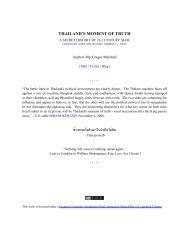THAILAND'S MOMENT OF TRUTH - ZENJOURNALIST
THAILAND'S MOMENT OF TRUTH - ZENJOURNALIST
THAILAND'S MOMENT OF TRUTH - ZENJOURNALIST
You also want an ePaper? Increase the reach of your titles
YUMPU automatically turns print PDFs into web optimized ePapers that Google loves.
and shortly after meeting them, invited some student delegates into the palace for an audience. They<br />
emerged to say that Bhumibol had ordered the junta to agree to a new constitution. Most of the protesters<br />
believed they had won, but tens of thousands remained camped around Chitralada Palace overnight, and<br />
the following day, violence erupted. Tanks rolled down Rachadamnoen Avenue, with troops firing on<br />
students; they were also shot at from above, including by Narong himself, from helicopters hovering<br />
overhead. Students commandeered buses and fire engines and tried to ram them into tanks. At least 70<br />
people were killed.<br />
Desperately trying to escape the bloodshed, some students clambered over the walls of Chitralada Palace.<br />
They were given sanctuary by the royal family:<br />
Probably the most important act that symbolically defined the monarchy in Thai politics was on<br />
the morning of 14 October when demonstrators who were beaten by police in the street beside the<br />
palace climbed over the fence seeking refuge inside the palace ground. Then, the royal family in<br />
informal dress came out to meet and expressed sympathy to students. By the evening, the military<br />
junta had been forced out, thanks to a rival faction within the military that gained the upper hand,<br />
and – it is said – to an agreement between the junta and the palace. A grim-faced King Bhumipol<br />
appeared on television and declared 14 October ‘‘the Most Tragic Day’’, and appointed as prime<br />
minister the President of his Privy Council. [Thongchai, Toppling Democracy]<br />
The Three Tyrants fled the country. It was an unprecedented moment in Thai history, the first time a<br />
popular uprising appeared to have succeeded in achieving political change. And as Thongchai argues,<br />
almost paradoxically it was also the beginning of the king’s status as the ultimate arbiter and saviour of<br />
the nation at times of great crisis:<br />
The same moment, then, that gave birth to people’s power and to the opportunity of politicians<br />
in the parliamentary system was also the new beginning for the monarchy in Thai politics. Most<br />
importantly, the king became the higher authority “above” normal politics. But being “above”<br />
politics no longer meant being beyond or out of politics. It meant being “on top of” or overseeing<br />
normal politics. [Thongchai, Toppling Democracy]<br />
Handley describes how the events of October 1974 became a seminal moment in terms of fostering<br />
Bhumibol’s image of a democratic monarch who ruled for the good of the people:<br />
October 14 has ever since taken on legendary proportions, in Thai consciousness and in<br />
Bhumibol's own record. To the students of that and succeeding generations, it was an<br />
unprecedented people's uprising against tyranny...<br />
In official histories, however, it was the king who had single-handedly restored constitutionalism<br />
and democracy. Rather than credit the popular uprising, later books and articles overwhelmingly<br />
emphasized King Bhumibol's intervention against the dictators, saving the country from disaster.<br />
However it was characterized, the October 1973 uprising marked a new zenith in the restoration<br />
of the throne's power and grandeur. [Handley, The King Never Smiles]




